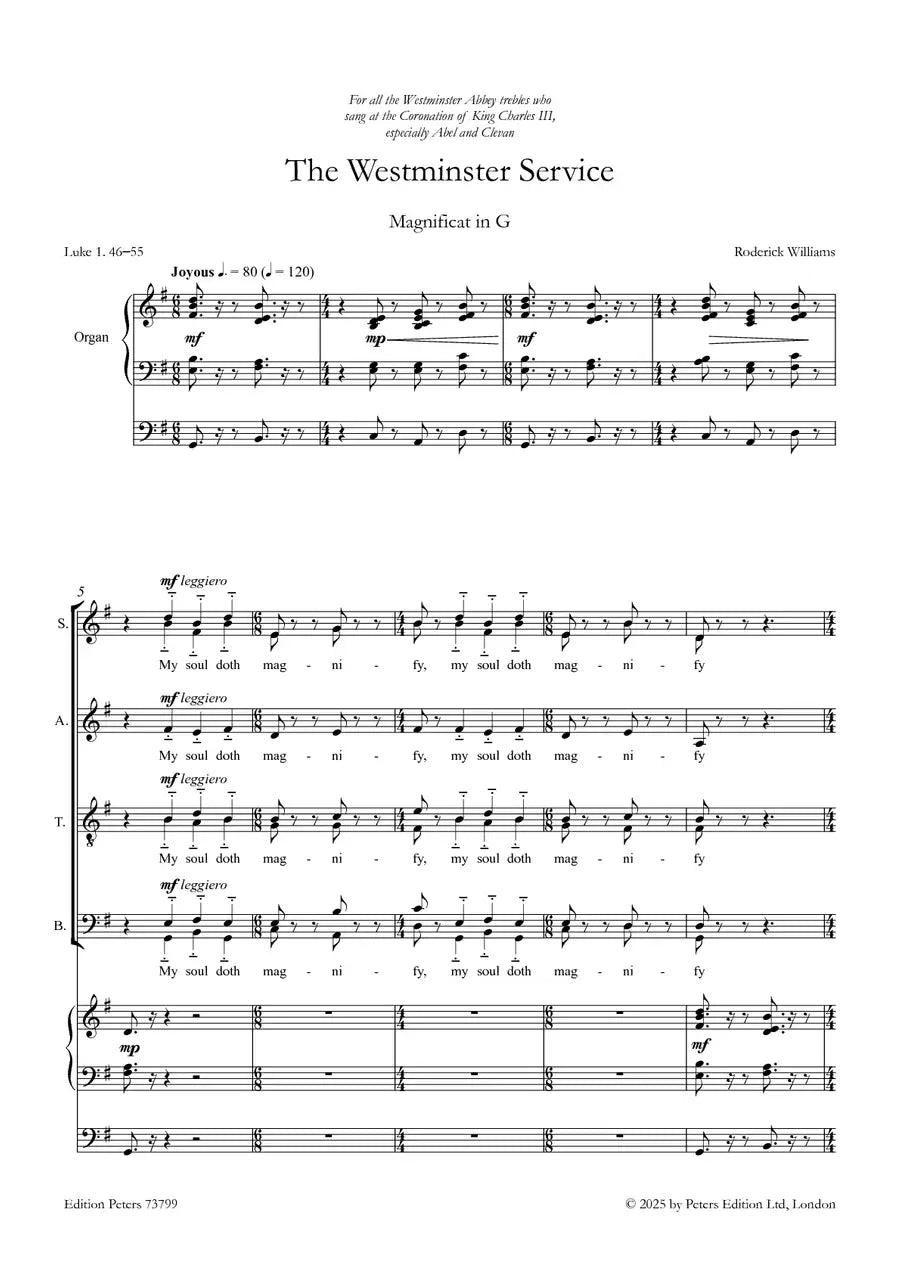Roderick Williams
The Westminster Service
- Composer: Roderick Williams (1965-)
- Format: Choral Octavo
- Instrumentation: Organ, SATB Choir
- Work: The Westminster Service
- Work Language: English
- ISMN:
- Pages: 32
Description
It was a particular pleasure and honour to be invited to write a new service for the choir of Westminster Abbey alongside whom I have sung on a number of occasions, including a service to commemorate the Abolition of Slavery and of course the Coronation of King Charles III.
My initial response to this commission was to explore how Mary, most likely a teenage girl, would have been overwhelmed to experience a visitation from an archangel, not to mention hearing the news that she would soon give birth and then that her child would change the course of history. This scenario created in my mind an almost operatic treatment, based on awe, wonder and quite some degree of fear.
However, re-reading Luke 1, I realised that Mary had some time to process this extraordinary visitation as she ran to Elizabeth's home and by the time she had reached there, a different mood had taken over her, giving her the impetus to break out into the remarkable, bold words that form the Magnificat. I was struck by the sense of joy, the sheer thrill of her realising she had a new a wonderful purpose and that joy is made even more ecstatic by her youth and her humble origins. It seemed natural for this joy to continue into the words spoken by the ageing Simeon, who finds the release he has been craving, finally rewarding his patience.
A further influence on my writing was the Sacred Concerts of Duke Ellington, the third of which was premiered at Westminster Abbey in 1973. Although I don't have a particular background in jazz, I did compose entire jazz choral evensong and choral matins services which were broadcast in 2006 and 2007 respectively. My desire was to write music in a jazz style that might be suitable for everyday use, to bring the sense of joy and excitement into Anglican worship that Duke Ellington's concerts suggested to me.
However, those services were written for choir and jazz piano trio and proved too complicated to incorporate into a general church setting. I hope that the Westminster Service will prove easier to manage, even though it may still test the mettle of many a choir. I also hope that the joy of singing the music will make the effort required feel worthwhile.
Publishers use a lot of words to describe what they sell, and we know it can be confusing. We've tried to be as clear as possible to make sure you get exactly what you are looking for. Below are descriptions of the terms that we use to describe the various formats that music often comes in.
Choral Score
A score for vocalists that only contains the vocal lines. The instrumental parts are not there for reference. Generally, cheaper than a vocal score and requires multiple copies for purchase.
Facsimile
Reproductions of the original hand-written scores from the composer.
Full Score
For ensemble music, this indicates that the edition contains all parts on a single system (there are not separate parts for each player). In larger ensembles, this is for the conductor.
Hardcover
Hardbound. Generally either linen-covered or half-leather.
Orchestral Parts
Similar to a wind set, this is a collection of parts. In the case of strings, the numbers listed are the number of copies included, though generally these are available individually (often with minimum quantities required).
Paperback
When publishers offer multiple bindings (e.g. hardcover) or study scores, this is the "standard" version. If you're planning to play the music, this is probably what you want.
Performance / Playing Score
A score of the music containing all parts on one system, intended for players to share. There are not separate parts for each player.
Set of Parts
For ensemble music, this indicates that there are separate individual parts for each player.
Solo Part with Piano Reduction
For solo pieces with orchestra, this is a version that contains a piano reduction of the orchestra parts. For piano pieces, two copies are typically needed for performance.
Study Score
A small (think choral size) copy of the complete score meant for studying, and not playing. They make great add-ons when learning concertos and small chamber works.
Vocal Score
A score prepared for vocalists that includes the piano/organ part or a reduction of the instrumental parts.
Wind Set
For orchestral music, this is a collection of wind and percussion parts. The specific quantities of each instrument are notated.
With Audio
In addition to the printed music, the edition contains recordings of the pieces. This may be an included CD, or access to files on the internet.
With / Without Fingering (Markings)
Some publishers prepare two copies - a pure Urtext edition that includes no fingering (or bowing) suggestions and a lightly edited version that includes a minimal number of editorial markings.




